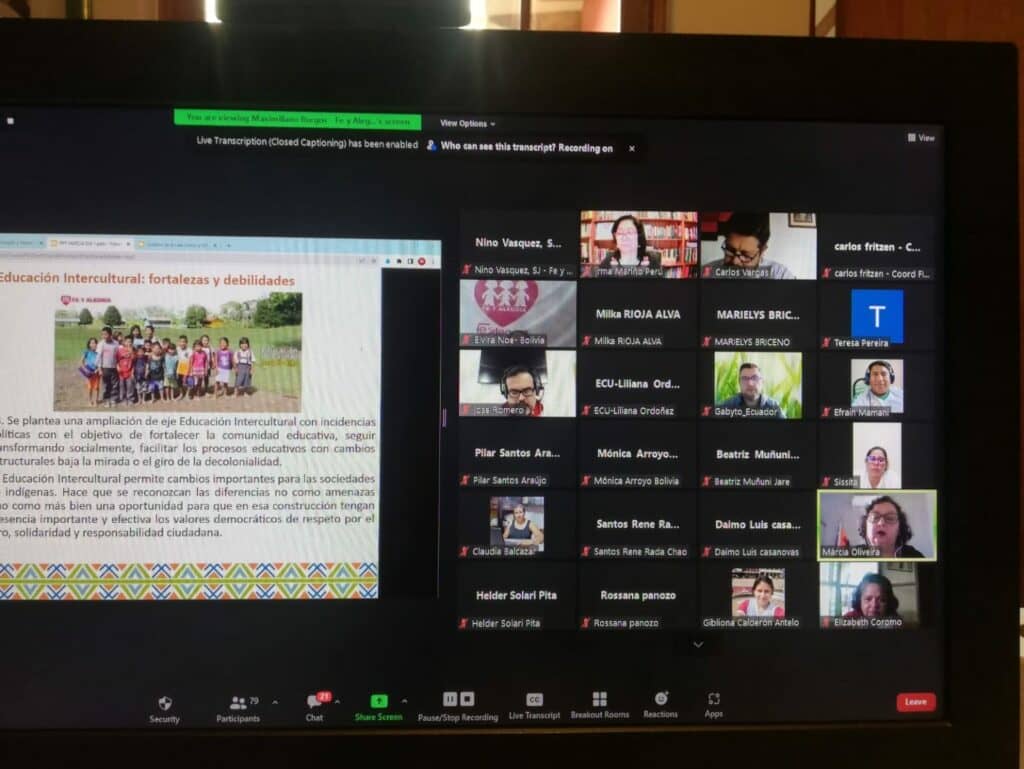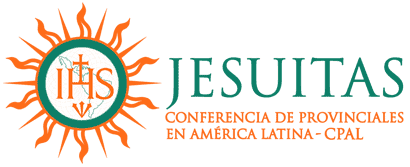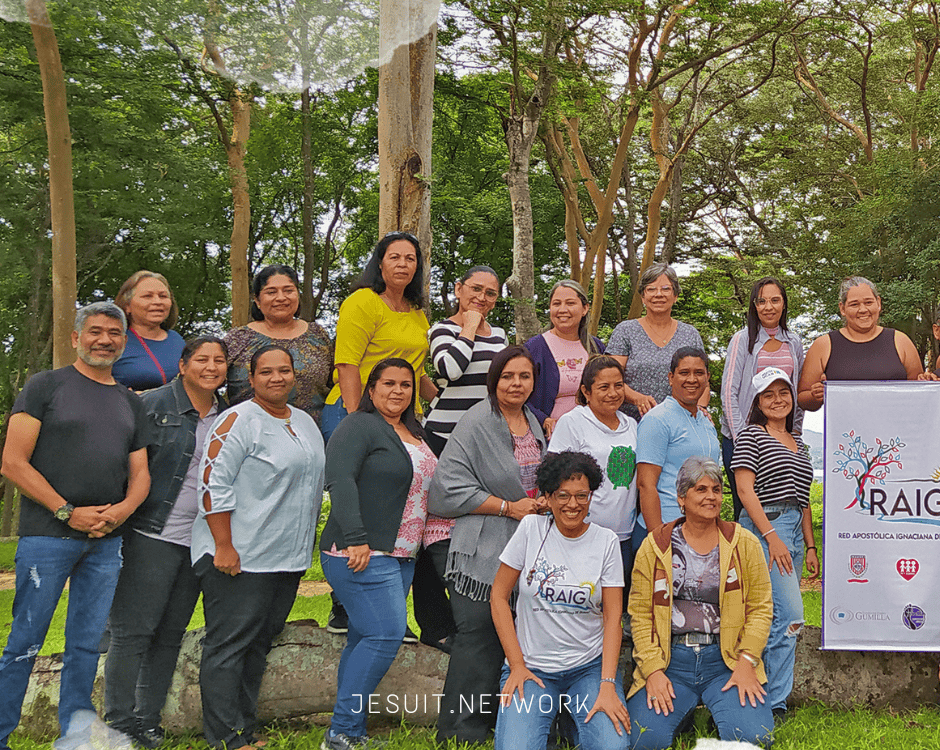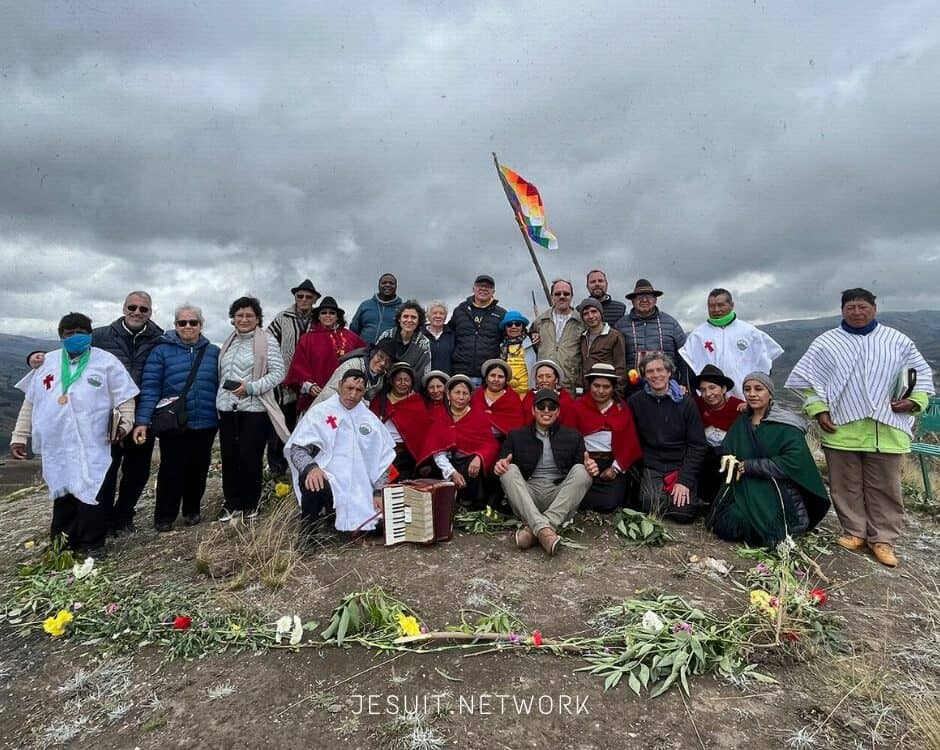This website uses cookies so that we can provide you with the best user experience possible. Cookie information is stored in your browser and performs functions such as recognising you when you return to our website and helping our team to understand which sections of the website you find most interesting and useful.
Integral Ecology Network: working for a better education
The celebration of the IV Meeting of the Integral Ecology and Panamazonia Network sought to analyse the achievements made and the new objectives to be set in the field of education
The International Federation of Fe y Alegría held the IV Meeting of the Integral Ecology and Panamazonia Network from June 22nd to 24th, with the title “Cultivating and growing the contribution of Fe y Alegría in Panamazonia“.
This meeting was convened by the Federation in the context of the implementation of the project “Amazonía; Cuidado de la casa común: Sensibilización, educación intercultural, educación bilingüe y cuidado de la naturaleza en los centros de Fe y Alegría” which are part of the Pan-Amazonian region of Venezuela, Ecuador, Peru, Bolivia and Brazil. The project is a joint initiative of the Jesuit Pan-Amazonian Service (SJPAM), CPAL and the International Federation of Fe y Alegría, with the support of Alboan and the Xavier Network.

The objective of the meeting was to discern the most significant aspects of the educational presence in the Pan-Amazon region and its projection based on the results of the external evaluation, closing the fourth year of the project’s implementation.
It was possible to identify the central aspects that contributed to the strengthening of educational and community actors in the Amazonian territories in the three lines of action (intercultural education, bilingual education and care and defence of nature). These aspects included a sense of commitment to the most vulnerable populations, networking through institutional agreements, the formation of new leadership for the defence of life, the deepening of participatory action in harmony with local cosmovision and cultures, social and political advocacy for transformation at different educational levels, both official and community, the generation of knowledge and the production of educational materials, among other strengths.
Based on this reflection, the following commitments were made:
- Rethink the work based on the contextual analysis of each centre, taking on the challenge of contemporary mobility for forest peoples (indigenous peoples, peasants, riverside dwellers and Afro-descendants) and the challenges of thinking from the integration of society-territories in the common home, as well as the challenges for the decolonisation of knowledge through research and the production of curricular materials and programmes designed by the participating populations themselves.
- To advance in the construction of an integral ecology policy that allows us to define the meaning of this perspective and to mainstream it in all educational centres, as a form of educational life, seeking alliances with other institutions and community initiatives that are already working for the care of the environment, and participating in spaces for critical reflection and action for the care of the environment.
- Working more strongly for ecological spirituality based on the proposals of Laudato Si’ in school-community environments and the promotion of spaces for dialogue, reflection and discernment on the biodiversity of the planet and the importance of securing its ecosystems.
On the first day, 84 people participated, with the participation of the initiative’s coordination team, Leire Morquecho, Carlos Fritzen SJ and the initiative leaders Irma Mariño and José Romero, the coordinators of each country and a large number of teachers. It was their contributions that enriched this reflective meeting from their classroom experiences.
The opening ceremony was led by Cardinal Pedro Barreto, followed by Carlos Fritzen SJ and Irma Mariño. Their messages highlighted the work with love that is done in the Amazon, the pleasure and pleasure it gives to work for this region, the work that is done facing difficulties with hope and the effort put into the teams for an education that transforms lives, for a better life in balance in our common home.
An important theme throughout the meeting was that of territories and their relationship with the mobility of forest societies, understanding that it is the loss of these territories that expels them to live in highly precarious situations, threatening the possibility of giving continuity to their languages, and thus to the transfer of knowledge present and made explicit through orality, in this sense the commitment to accompany them in their mobility processes is assumed.
At the end of the meeting, Fr Roberto Jaramillo SJ, President of CPAL, stressed the importance of local, national, regional and even global alliances in order to take care of our common home; and the words of Fr Alfredo Kiteso SJ, Director of Fe y Alegría in the Democratic Republic of Congo, who called for a firm stance on social and ecological problems in order to build an education of integral ecology with Christian values and principles, but also integral ecology.
Subsequently, a working proposal was presented that considers the 5 Rs:
Recording violence
Revealing reality
Recovering memory
Cultural resistance
Recreating new forms of life.
Ernesto Cavassa SJ, Director of Fe y Alegría in Peru, was in charge of the celebration of the Eucharist. The outcome of this conference was embodied in the Agreements and Commitments reached (in Spanish).
Information originally published on the CPAL and Fe y Alegría websites.





